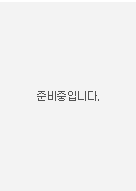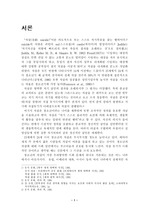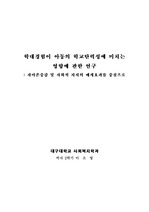

PARTNER
검증된 파트너 제휴사 자료
성인기 자기존중감과 우울의 상호 관계 (The Reciprocal Relationship Between Self-esteem and Depression in Korean Adults)
14 페이지
최초등록일 2025.03.11
최종저작일
2019.08

-
서지정보
· 발행기관 : 인문사회 21
· 수록지 정보 : 인문사회 21 / 10권 / 4호 / 1049 ~ 1062페이지
· 저자명 : 조명기, 최희철
초록
본 연구는 20세 이상 성인 대상으로 자기존중감과 우울의 인과적 방향성을 알아보기 위하여 상처모델, 인지적 취약성 모델, 상호 순환적 모델의 타당성을 검증하는데 있다. 한국복지패널의 1차 년도부터 7차 년도까지 자료를 바탕으로 자기존중감과 우울의 상호적 관계를 자기회귀 교차지연 모형과 AMOS 7을 이용하여 분석하였다. 분석 결과 첫째, 초기의 자기존중감과 우울이 6년 뒤의 자기존중감과 우울에 유의미한 영향을 미쳤으며, 성인의 자기존중감과 우울의 상호적 관계에서 상처모델, 인지적 취약성 모델, 상호 순환적 모델 모두가 지지되었다. 둘째, 긍정적 자기존중감보다 부정적 자기존중감이 우울에 더 강한 효과를 보였다. 이는 성인의 부정적 자기존중감을 적응적으로 변화시키는 것이 중요함을 보여주고 있다. 이러한 결과는 특정 시기의 예방 프로그램이 6년 후까지 지속될 수 있는 것으로 향후 적극적이고 다양한 개입의 필요성을 말해주고 있다.영어초록
This study examined the validity of the scar model, the cognitive vulnerability model and the reciprocal effect model to find out the correlation between self-esteem and depression in adults over 20 years old. Based on the data from the first to seventh year of the Korean Welfare Panel, the correlation between self-esteem and depression was analyzed by applying the autoregressive crossover delay model and AMOS 7. As a result of the analysis, first, the self-esteem and depression at the previous time had a significant effect on the self-esteem and depression after 6 years. This result supports the scar model, the cognitive vulnerability model and the reciprocal effect model in the mutual relationship of self-esteem and depression of adults. Second, negative self-esteem was more effective in depression than positive self-esteem. This indicates that it is important to adaptively change the negative self-esteem of adults, and it is shown that prevention programs at a particular time of life will be able to last up to 6 years later and coming positive and various interventions should be needed.참고자료
· 없음태그
-
자주묻는질문의 답변을 확인해 주세요

꼭 알아주세요
-
자료의 정보 및 내용의 진실성에 대하여 해피캠퍼스는 보증하지 않으며, 해당 정보 및 게시물 저작권과 기타 법적 책임은 자료 등록자에게 있습니다.
자료 및 게시물 내용의 불법적 이용, 무단 전재∙배포는 금지되어 있습니다.
저작권침해, 명예훼손 등 분쟁 요소 발견 시 고객센터의 저작권침해 신고센터를 이용해 주시기 바랍니다. -
해피캠퍼스는 구매자와 판매자 모두가 만족하는 서비스가 되도록 노력하고 있으며, 아래의 4가지 자료환불 조건을 꼭 확인해주시기 바랍니다.
파일오류 중복자료 저작권 없음 설명과 실제 내용 불일치 파일의 다운로드가 제대로 되지 않거나 파일형식에 맞는 프로그램으로 정상 작동하지 않는 경우 다른 자료와 70% 이상 내용이 일치하는 경우 (중복임을 확인할 수 있는 근거 필요함) 인터넷의 다른 사이트, 연구기관, 학교, 서적 등의 자료를 도용한 경우 자료의 설명과 실제 자료의 내용이 일치하지 않는 경우
“인문사회 21”의 다른 논문도 확인해 보세요!
-
일본 프로키노 영화상영회에 대한 기억(1960년대-1980년대) 16 페이지
이 글은 전후 일본인들이 전시기(戰時期)를 망각한다고 이야기되는 상황에서, 1960-80년대 진보적 지식인들의 전시기 프로키노 영화상영회 기억에 대해 알아보려고 한다. 그 기억은 진보지식인의 저작과 영화복원 작업을 통해 알아본다. 진보 지식인들은 당시 일본인들의 전반적 기억과 달리 프로키노가 활동하던 전시기를 망각하지 않고 억압적이기만 한 시기로 설정하였으.. -
영어 학습자 네러티브와 스탠스를 통한 아이덴터티 12 페이지
본 연구는 ESL 프로그램을 수강하는 학습자를 대상으로 네러티브에서 나타난 스탠스 표지어를 통해 학습자의 아이덴터티가 어떻게 설정되는 지를 조사하고자한다. 미국 남부의 한 주립대학교 ESL 학습자 9명이 본 연구에 참여하였다. 참여자들의 영어실력은 중-하에 속했고 문화적 배경은 서로 달랐다. 참여자는 개인 경험을 한 차례 이야기한 후, 바로 옆에 위치한 교.. -
부모의 양육방식에 따른 장애아동 형제자매의 회복탄력성 및 심리적 안녕감 16 페이지
본 연구는 부모의 양육방식에 따라 비장애 형제자매의 회복탄력성과 심리적 안녕감이 어떠한 차이를 보이는지를 알아보는 데 그 목적이 있다. 서울, 부산, 울산, 경남의 일반학교 및 특수학교에 재학 중인 장애학생의 비장애 형제자매 124명을 대상으로 설문조사를 실시하였다. 자료의 분석을 위하여 SPSS 통계 프로그램으로 빈도분석, T검정, Pearson 상관관계.. -
대학생의 열등감과 사회불안간의 관계에 대한 대인관계의 매개효과 16 페이지
대학생의 열등감이 사회불안에 미치는 영향과 대인관계를 매개하여 사회불안에 어떠한 영향을 미치는지를 분석하고자 하였다. 본 연구의 조사대상은 대학생 619명을 대상으로 하였으며, 구조방정식 모형으로 분석하였다. 연구의 주요결과는 다음과 같다. 첫째, 대학생의 열등감은 사회불안에 부적(-)인 영향을 미치는 것으로 나타났다. 둘째, 대학생의 열등감은 대인관계에 .. -
대학생의 내외적 수단성 및 진로미결정성이 행복감에 미치는 영향 14 페이지
이 연구는 대학생의 행복감에 영향을 미치는 변인 중 내외적 수단성과 진로미결정성이 어떠한 구조적 관계를 가지고 있는지 확인해 보고자 함에 목적이 있다. 이를 위해 국내 2개 지역의 대학생 311명을 대상으로 조사를 실시하였으며, 내외적 수단성과 진로미결정성, 행복감을 측정하였다. 그 결과는 다음과 같다. 먼저, 내적 수단성과 외적 수단성이 독립된 형태로 대..
찾으시던 자료가 아닌가요?
지금 보는 자료와 연관되어 있어요!
문서 초안을 생성해주는 EasyAI






